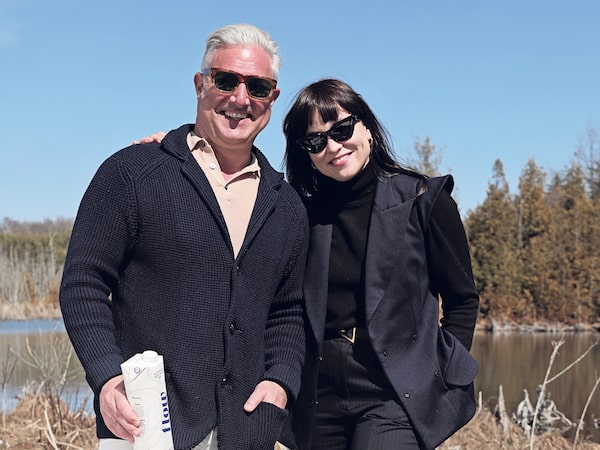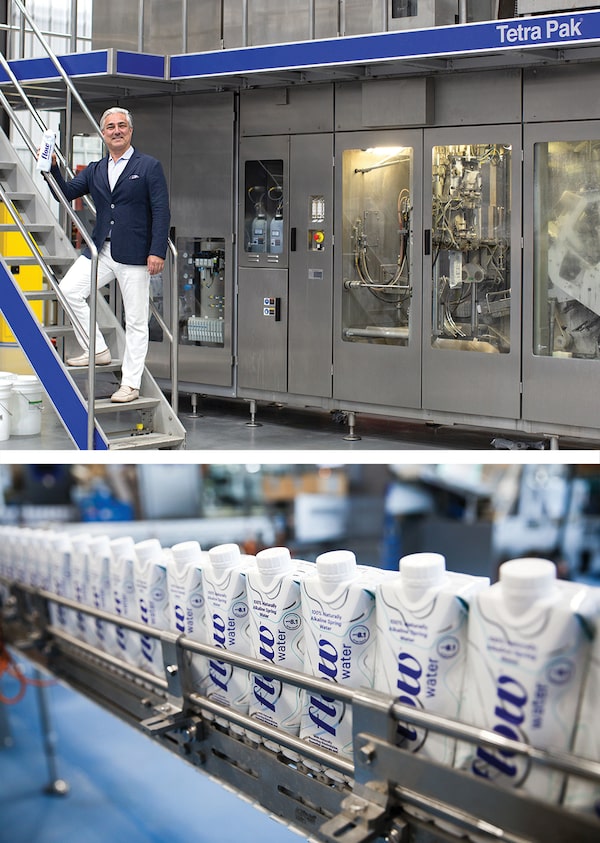
Power couple Nicholas Reichenbach and Tammy Eckenswiller are the driving force behind Flow Alkaline Spring Water, a packaged beverages brand known equally for innovation as for its dedication to environmental, social and governance (ESG) performance. The company is planning to go public this year.RICHARD QUINLAN
A fount of inspiration can reveal itself in surprising places. For serial entrepreneur Nicholas Reichenbach, it was the sight of mountains of plastic bottle waste following the Burning Man festival in 2013 that spurred him to imagine a packaged water company that could be “better for people and the planet.”
The power of Mr. Reichenbach’s vision has been affirmed by the fast-growing success of Flow Alkaline Spring Water, a brand driven as much by cutting-edge innovation as its dedication to environmental, social and governance (ESG) performance.
This year, Flow’s laudable ESG efforts landed it a coveted place on Canada’s Clean50 list, which recognizes sustainability projects completed in the prior two years based on innovation and an ability to inform and inspire other Canadians.
Flow’s success is rooted in several home-grown advantages. For starters, Mr. Reichenbach was able to tap a natural, mineral-rich aquifer on the Reichenbach family’s fifth generation southern Ontario property, which releases over a million litres of smooth-tasting, alkaline spring water a day.
He was also able to start the company with a group of trusted friends and family, including his wife Tammy Eckenswiller, a former fashion-industry executive who came up with the brand’s name and stylish design, and is now Flow’s senior vice president of creative.
Together, they combined their talents to manifest the thriving, globally ambitious B-Corp now in the planning stages of going public, that Flow is today.
“Flow is not shifting slowly to a ‘more responsible’ model because of consumer pressure; Flow started with a responsible model. Consumers really need to reward that degree of innovation and responsible behaviour,” says Gavin Pitchford, CEO of Delta Management and Clean50 founder.
Indeed, Flow has tapped into explosive consumer demand for ethically sourced and mindfully packaged premium beverages. A small army of A-list celebrity investors and hundreds of influencers have helped Flow create a movement that has attracted nearly 18 million loyal consumers and growing. Flow is now Canada’s fastest-growing premium water and functional beverage brand, and one of fastest-growing premium enhanced water brands in the U.S. with over 25,000 listed locations.
Beyond its evolving list of naturally sourced, organically flavoured spring water products, some infused with functional ingredients like collagen, Flow’s brand credibility is rooted in a host of laudable ESG initiatives.
It starts at the source
Flow’s award-winning spring water, sourced from the company’s Ontario and Virginia springs, was carefully selected for its naturally occurring minerals and electrolytes, and smooth refreshing taste.
Both springs benefit from a geological composition that imbues the water with essential minerals including calcium, magnesium and potassium, and compounds like calcium carbonate that impart alkalinity.
“Beautiful artesian springs like ours are very rare in North America,” says Mr. Reichenbach, noting, “It was serendipity that we were able to acquire one in the Shenandoah Valley, which releases even more water than our family spring.”
For Mr. Reichenbach and Flow, conservation is always top of mind. “These are precious resources. We work with hydrologists to monitor our operations and only use a small amount of the abundant water that flows through the springs. The goal is to protect the source for current and future generations.”

Flow’s Tetra Pak containers are 100 per cent recyclable and made from mostly renewable materials, and its packaging plants are carbon balanced.SUPPLIED
Circular economy innovation
From the outset, creating an environmentally superior alternative to plastic bottles and aluminum cans was among Mr. Reichenbach’s top priorities.
Flow teamed up with sustainable packaging giant Tetra Pak to come up with a solution that moved “beyond the plastic bottle.” The partnership yielded a 100 per cent recyclable, plant-fibre-based pack currently made from up to 75 per cent certified renewable resources, including FSC-certified paperboard. A cap made from sugarcane helps preserve the high-quality spring water’s taste and health benefits.
Mr. Reichenbach estimates that by choosing Flow, consumers have helped to eliminate tens of thousands of tonnes of plastic waste and related CO2 emissions in the past two years alone.
In the next few years, he also expects Flow’s package to be sourced from 100 per cent renewable materials, while downstream efforts continue to turn used packages into useful materials.
“Our recycling partners at Continuus Materials turn empty Flow packs into green roofing boards,” he says.
“We believe in transparency and traceability in the way we operate and manage our materials,” he says. “We only partner with companies that also have very clean supply chains and have a strong sustainability program.”
Flow’s fully traceable raw materials are drawn from sustainable sources, such as FSC-certified paper and Bonsucro-certified sugarcane. “Our main supplier is certified by Sedex and is Ecovadis Gold level,” notes Mr. Reichenbach.
Efficient, carbon-balanced operations
Through a variety of efforts, Flow has balanced its operational carbon emissions to net zero, covering shipping, plant fuel and energy usage, logistics and travel.
Contributing factors include Flow’s Canadian plant’s purchase of green energy from Bullfrog Power since 2017. Stateside, clean energy supplier Dominion Energy powers Flow’s U.S. operations. Flow also purchases high-quality carbon offsets from The Gold Standard foundation.
Both plants are vertically integrated and located close to their respective spring water sources and major markets, which helps further reduce transportation-related emissions. The U.S. plant, for example, serves most of the U.S. market within one day of trucking.
Socially mindful business
Flow has also been stepping up efforts to help people in need; for example, those lacking water resources in times of crisis, explains Mr. Reichenbach.
“We were at the forefront of supporting frontline workers during COVID-19 when we donated products worth over $1-million US in Canada and the U.S. We also step in when needed and help Indigenous communities ensure they have a healthy and safe water supply, as we did recently for First Nations in Alaska,” he says.
Flow also contributed some 50,000 litres of water to Bahamas relief in the wake of Hurricane Dorian in 2019, sent truckloads of water to Houston during the recent winter storm crisis, and made a sizable donation to the NAACP Legal Defense Fund. In recent years, the company has also contributed hundreds of thousands of litres of water to food banks and community organizations.
Ms. Eckenswiller says Flow’s entire team takes the business’s ESG commitments to heart. “One of the best things about Flow is our dedicated team of people who share our vision and produce amazing results. We care deeply about our internal ‘Flow family,’ as much as we do our communities,” she says. “We all passionately believe in what we’re doing. Working for Flow is more than just a job for us.”
Mr. Reichenbach adds, “Together, we can make the planet a better place, one package at a time, one activity at a time, for generations to come.
“As entrepreneurs, business leaders and members of society, we have a responsibility to push the envelope on sustainability and have positive social impacts. There’s no better place to start than with consumer products that in the past we may have taken for granted, but which are part of a complex web of life connecting us all.”
Advertising feature produced by Randall Anthony Communications with Canada’s Clean50. The Globe’s editorial department was not involved.